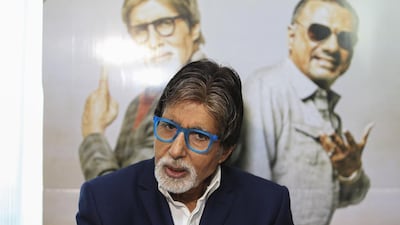In a room full of journalists and flashing cameras, Amitabh Bachchan is calm and composed, albeit a bit worse for the wear.
The 71-year-old megastar, who has more than 180 films to his credit in his 40-year-old career in Hindi cinema, was in Dubai yesterday for the red-carpet premiere of his new film Bhoothnath Returns, out in UAE cinemas today. His co-stars Boman Irani and little Parth Bhalerao, the child actor who plays a street kid in the film, also accompanied him.
The non-stop promotional tour for the film may have taken a toll on Bachchan’s health, but his funny bone is intact. He wrote yesterday on his blog at srbachchan.tumblr.com: “Press meets, interviews, shifting from one microphone to the other, responses to the questions which sound and look the same, a trying time for the acumen of an actor ... tested and dried ..”
“It’s a challenge for an actor,” confesses Bachchan, adjusting his electric blue glasses. “You have to give the same responses but make it sound as thought you’re hearing the question for the first time.”
But that doesn’t stop him from recognising that promotions have become a part of filmmaking, though.
“There is a lot of budgeting and a lot of time that goes into promotions,” he says. “People who have done it well have seen results. The lifespan of a film is short. You want to get collections in at the very beginning and that’s where promotions help. Of course, there are the purists who insist that promotions are not necessary if the film has its own strength, but Boman and I are very obedient actors.”
He looks at Irani and chuckles. “We do what our producer asks us to do. He asked us to come to Dubai after having worked the whole night and here we are. We try to look pleasant and happy and talk about the film.”
And not least because the UAE is a huge market for Bollywood.
“Well, it’s the leading international market now for Indian cinema,” Bachchan says. “We are happy and proud to be here. This is perhaps the first time I am here for the premiere of a film of mine. I have been here many times for other occasions. It’s always a joy to be here. It’s like stepping out of my home in Mumbai and stepping into another home. The people here are friendly and warm, and we have so many from our own land here. They understand us and they show their affection. It’s fantastic!”
When asked whether all the time spent on shooting, and then on promotions, takes a toll on him, and whether he ever resents having to spend so much time away from family, especially his grandchildren, Bachchan shrugs it off as part of the job.
“This happens in every profession. You have a job to do and, at times, you have to make tough choices. When we went into the profession, our families knew what we were going to do and that our time was going to be pretty limited with them. They understand and we understand and things work out.”
Talking about the film Bhoothnath Returns, Bachchan refuses to divulge whether he plays a ghost contesting in an election, which is what the trailers seem to indicate.
“Yes, the trailer seems to say this,” he says, “but you will get the correct answer when you see the film. Revealing all that now would not be proper. But yes, there is an occasion where a situation arises where there is the possibility of fighting an election. Whether he does or does not, what the results are … you have to see the film to find that out.”
• Bhoothnath Returns is now playing in theatres across the UAE
artslife@thenational.ae

